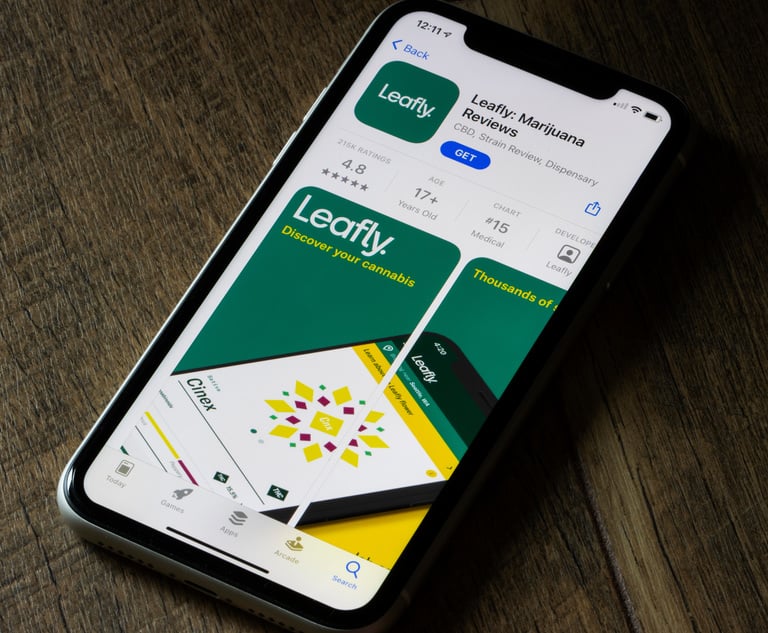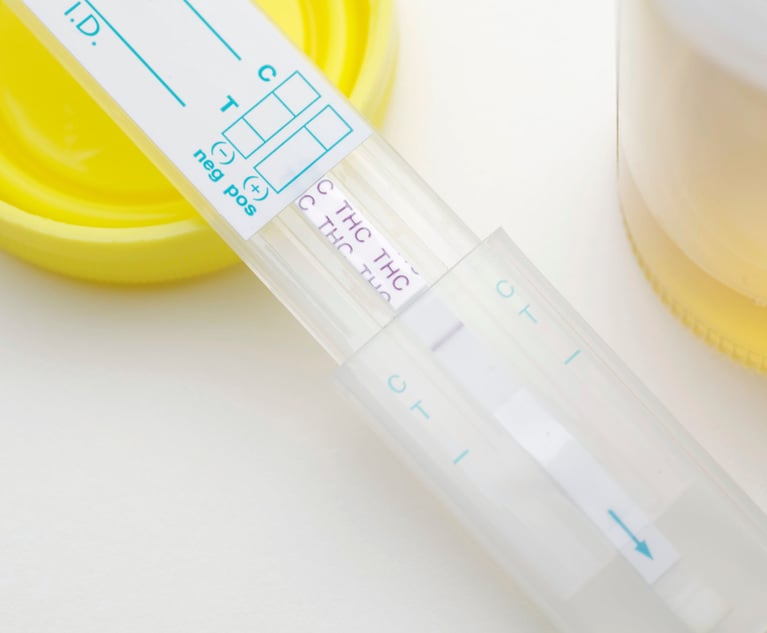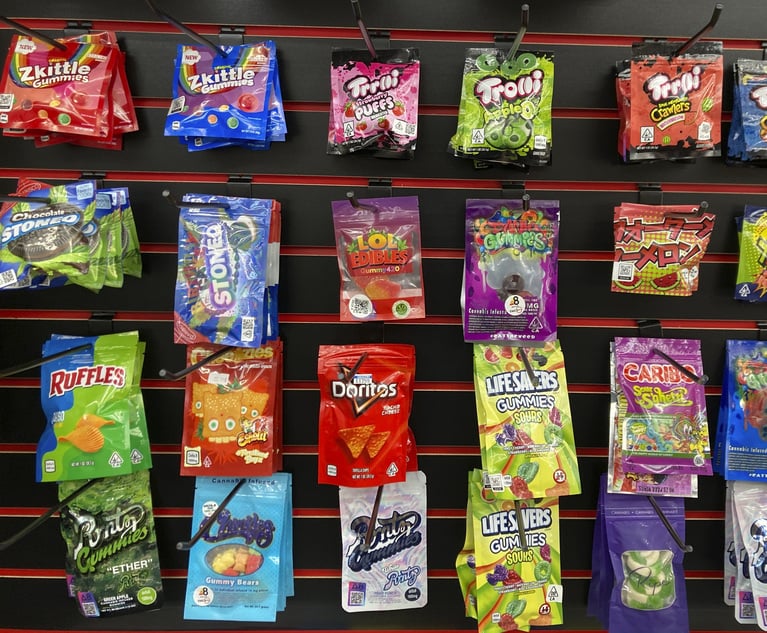Higher Law: Cannabis & COVID-19: Dykema Q&A | Who Got the Work: New Breach of Contract Suit | Headlines: New York's Plans on Hold | Radar: Upcoming Webinars
Welcome to Higher Law, and we hope you, friends, family and colleagues are safe and healthy. This week we're looking at: A Dykema partner's view of the cannabis industry and COVID-19 • The FTC goes after CBD coronavirus claims.
April 02, 2020 at 04:00 PM
8 minute read
Welcome back to Higher Law, our weekly briefing on all things cannabis. I'm Cheryl Miller, reporting for Law.com from Sacramento.
This week we're looking at: A Dykema partner's view of the cannabis industry and COVID-19 • A trademark lawsuit over "hemp benchmarks" • The hunt for the "perfect high" • The FTC goes after CBD coronavirus claims
Thanks for reading as we all try to figure out this new, hopefully very temporary, normal. What's your strategy? Your firm's? Let me know what's going on at [email protected] or call me at 916.448.2935. Follow me on Twitter @capitalaccounts.
 

Q&A: Dykema's Cannabis Practice Leader Talks Cannabis and COVID-19
For R. Lance Boldrey, COVID-19 has become all-consuming. The Lansing, Michigan-based leader of Dykema's cannabis law practice is working from home and fielding constant questions from clients about new workplace procedures, worker and public safety and ever-changing rules.
Boldrey recently took a few minutes to talk with me about what he's seeing as cannabis clients try to cope with the impacts of the novel coronavirus. Our conversation is edited for length and clarity.
Higher Law: In some ways it seems like a good time to be in the marijuana business–demand is high.
Boldrey: We have certainly seen a spike in sales in Michigan. The week that the governor's executive order came out was by far the highest level of sales for both medical mairjuana and adult use that the state of Michigan has seen. Then with a limited number of facilities open and operating compared to many other states, if you extrapolate it out from that week we'd be on pace for a three-quarter-of-a billion-dollar year in sales.
We don't yet have sales data for this last week though, and anecdotally what we're hearing from clients is that some people were making significantly larger-than-usual purchases right when the stay-at-home orders started to go into effect. And those seem to be tailing off right now somewhat. It's certainly not the run on toilet paper but we have seen some stockpiling.
What issues are your clients facing?
The first is really what sorts of activities are considered essential. And fortunately the vast majority of states that have medical and adult-use industries up and operating have deemed those cannabis operations to be essential.
Even in those states, though, where adult-use is not considered essential, companies are grappling with the need to have employees, particularly at grows, continue to report to work to protect the inventory and the crop. Even in states like Michigan, where the businesses that sell are deemed essential, there's a question as to what sort of activities are essential to the operation of that business.
The perfect example of that is construction activities. Are construction activities for existing licensees within the stay at home order? Or are they within the exception to the stay at home order? What about folks who are not yet operational?
That's probably the biggest issue that a lot of our clients have been dealing with given the state of the Michigan industry, where we've got lots of facilities still building out or existing facilities expanding their operations. We have had approvals to continue construction where it's necessary to protect the inventory or where a lab is installing additional equipment for greater testing capability. But by and large operators that are not yet licensed and still trying to construct facilities are on hold right now.
Are regulators still processing permits and applications?
The state is very, very much on top of these issues. They're doing inspections with inspectors participating by Facetime. And they granted regulatory relief. License deadlines have all been extended out and they're also allowing the retail folks to sell to individuals whose identification or marijuana registry cards have expired, recognizing that it's hard to get those renewed right now.
What's your guidance to clients on these issues?
It's really on a case-by-case basis. Our clients obviously are trying to do the right thing, restricting occupancy in cultivation facilities, really paring back to the minimum staff able to operate. And we have seen some staffing reductions–people are being laid off. Thankfully they're able to access unemployment, but one of the issues is, of course, all these federal stimulus programs that benefit employers in other industries are not available to the cannabis industry.

Who Got the Work
>> Attorneys Amanda Greenspon of Munck Wilson Mandala and Andy Corea of Murtha Cullina are defending PanXchange, a physical commodity trading company, in a trademark lawsuit over its use of the phrase "hemp benchmarks." The case was filed Feb. 12 in Connecticut District Court by Whitmyer IP Group on behalf of New Leaf Data Services, a cannabis industry data provider. The case is assigned to U.S. District Judge Kari Dooley.
>> Lawyers from DLA Piper—including David Freeburg, Virginia Weeks and Andrew Escobar—on Friday removed a breach-of-contract lawsuit against Green Sky Labs, a Canadian technology incubator for the cannabis industry, and Green Sky Labs USA to the U.S. District Court for Washington's Western District. The suit was filed by Karr Tuttle Campbell on behalf of HDK Investments LLC.
>> Yetter Coleman's Shane Pennington is counsel to Scottsdale Research Institute on an application to the DEA to grow marijuana for medical research, according to a report at Science Magazine.
>> Attorneys at Woodrow & Peluso in Denver are representing plaintiff Bryce Abbink in a class action complaint against Good Chemistry I LLC. Abbink alleges Good Chemistry, which operates marijuana outlets in Colorado, violated the Telephone Consumer Protection Act by sending text-message solicitations without customers' express written consent. Good Chemistry has not entered an appearance yet.
>> Former local government attorney Davina Smith is the city of Sacramento's new cannabis program manager, the Sacramento News & Review reports. Smith was a deputy district attorney in Humboldt County before she became a deputy county counsel looking at land-use issues, code enforcement and cannabis laws. She doesn't like the title "pot czar" because "czars tend to get killed."

In the Weeds…
>> Legal weed scientists are chasing the "perfect high." "Wherever weed is legal, companies are claiming that they have figured out how to produce a bespoke high. The promises are specific—one California company, MedMen, offers its customers 'a surefire explosive orgasm'—and backed by scientific-sounding terminology like 'terpene profile' and 'cannabinoid breakdown.' Some of the research these companies cite to support what they are advertising has been published and peer-reviewed, but much of the recent work on the effects of cannabis has been conducted privately, and the companies are guarding their results as trade secrets." [NYT]
>> The feds are cracking down on some claims about CBD "crushing" the coronavirus. "The federal government is warning a former National Football League player's company to stop advertising his medicinal cannabis products as treatments for the novel coronavirus." [Daily Beast] Read one FTC and FDA letter here.
>> The coronavirus pandemic has spurred marijuana sales around the country. "Marijuana sales are booming, with some states seeing 20 percent spikes in sales as anxious Americans prepare to be hunkered down in their homes potentially for months. Weed sellers are staffing up too, hiring laid-off workers from other industries to meet demand. And in the midst of a historic market meltdown, stock prices for cannabis companies have surged, in some cases doubling since the public health crisis began." [Politico]
>> Cannabis legalization is apparently on hold as New York lawmakers face a budget deadline. Gov. Andrew Cuomo on Tuesday threw cold water on the chances of New York legalizing marijuana through the state's budget, saying an agreement on the issue was not likely. The April 1 deadline to pass a state budget was quickly approaching for legislators as Cuomo spoke. [Law.com]
>> Two Massachusetts marijuana workers have tested positive for coronavirus. New England Treatment Access, or NETA, confirmed that a worker at its cultivation and processing center in Franklin and an employee at its Northampton dispensary tested positive. Both employees "practiced excellent public health and social responsibility" and there is no chance any product was contaminated, a company statement said. Workers told the Boston Globe that social distancing guidelines were not consistently enforced or were impractical. Regulators are looking into the matter. [Boston Globe]
>> How recreational weed in Illinois went from illegal to essential in three months. The timing could not have been much better for Illinois, which ushered in a regulated recreational market in January and gave the product an "essential" label in March to continue sales during the pandemic. [Chicago Sun-Times]

All the Calendar Things
April 2 - Expert Webcast presents the webinar "The Impact of COVID-19 on the Cannabis Industry." Panelists include Dentons partner Eric Berlin.
April 3 - The State of Cannabis hosts the webinar "COVID-19 and the Cannabis Industry." Scheduled panelists include Buchalter partner Dawn Knepper; and Omar Figueroa and Laura Mendelsohn of the Law Offices of Omar Figueroa.
April 6 - Wilson Elser presents the webinar "Covid-19′s Impact on the Cannabis Industry." Of counsel Noelle Sheehan and associate Neil Willner will lead the discussion.
This content has been archived. It is available through our partners, LexisNexis® and Bloomberg Law.
To view this content, please continue to their sites.
Not a Lexis Subscriber?
Subscribe Now
Not a Bloomberg Law Subscriber?
Subscribe Now
NOT FOR REPRINT
© 2025 ALM Global, LLC, All Rights Reserved. Request academic re-use from www.copyright.com. All other uses, submit a request to [email protected]. For more information visit Asset & Logo Licensing.
You Might Like
View All
NY Cannabis Marketing Rulings / Rescheduling Effects / Honigman's Work on Trademark Suit / Goodbye
9 minute read
Workplace Weed and Labor Pacts / State AGs and Hemp / Maryland Licensing Suit / Vicente Sues Recruiter
9 minute readLaw Firms Mentioned
Trending Stories
Who Got The Work
Michael G. Bongiorno, Andrew Scott Dulberg and Elizabeth E. Driscoll from Wilmer Cutler Pickering Hale and Dorr have stepped in to represent Symbotic Inc., an A.I.-enabled technology platform that focuses on increasing supply chain efficiency, and other defendants in a pending shareholder derivative lawsuit. The case, filed Oct. 2 in Massachusetts District Court by the Brown Law Firm on behalf of Stephen Austen, accuses certain officers and directors of misleading investors in regard to Symbotic's potential for margin growth by failing to disclose that the company was not equipped to timely deploy its systems or manage expenses through project delays. The case, assigned to U.S. District Judge Nathaniel M. Gorton, is 1:24-cv-12522, Austen v. Cohen et al.
Who Got The Work
Edmund Polubinski and Marie Killmond of Davis Polk & Wardwell have entered appearances for data platform software development company MongoDB and other defendants in a pending shareholder derivative lawsuit. The action, filed Oct. 7 in New York Southern District Court by the Brown Law Firm, accuses the company's directors and/or officers of falsely expressing confidence in the company’s restructuring of its sales incentive plan and downplaying the severity of decreases in its upfront commitments. The case is 1:24-cv-07594, Roy v. Ittycheria et al.
Who Got The Work
Amy O. Bruchs and Kurt F. Ellison of Michael Best & Friedrich have entered appearances for Epic Systems Corp. in a pending employment discrimination lawsuit. The suit was filed Sept. 7 in Wisconsin Western District Court by Levine Eisberner LLC and Siri & Glimstad on behalf of a project manager who claims that he was wrongfully terminated after applying for a religious exemption to the defendant's COVID-19 vaccine mandate. The case, assigned to U.S. Magistrate Judge Anita Marie Boor, is 3:24-cv-00630, Secker, Nathan v. Epic Systems Corporation.
Who Got The Work
David X. Sullivan, Thomas J. Finn and Gregory A. Hall from McCarter & English have entered appearances for Sunrun Installation Services in a pending civil rights lawsuit. The complaint was filed Sept. 4 in Connecticut District Court by attorney Robert M. Berke on behalf of former employee George Edward Steins, who was arrested and charged with employing an unregistered home improvement salesperson. The complaint alleges that had Sunrun informed the Connecticut Department of Consumer Protection that the plaintiff's employment had ended in 2017 and that he no longer held Sunrun's home improvement contractor license, he would not have been hit with charges, which were dismissed in May 2024. The case, assigned to U.S. District Judge Jeffrey A. Meyer, is 3:24-cv-01423, Steins v. Sunrun, Inc. et al.
Who Got The Work
Greenberg Traurig shareholder Joshua L. Raskin has entered an appearance for boohoo.com UK Ltd. in a pending patent infringement lawsuit. The suit, filed Sept. 3 in Texas Eastern District Court by Rozier Hardt McDonough on behalf of Alto Dynamics, asserts five patents related to an online shopping platform. The case, assigned to U.S. District Judge Rodney Gilstrap, is 2:24-cv-00719, Alto Dynamics, LLC v. boohoo.com UK Limited.
Featured Firms
Law Offices of Gary Martin Hays & Associates, P.C.
(470) 294-1674
Law Offices of Mark E. Salomone
(857) 444-6468
Smith & Hassler
(713) 739-1250










